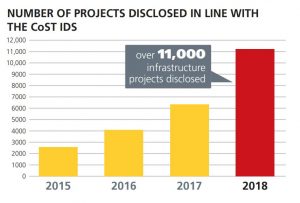This article is based on a CoST opinion piece which was originally published by Apolitical. Read the full blog post here.
When it comes to public infrastructure investment, open government and transparency are king.
The value of global infrastructure output is expected to reach $17.5 trillion per annum by 2030, but there is a gap in national budgets, particularly in low and middle income countries, to meet this. Exacerbating this is the fact that a further 10–30% could be lost to corruption, mismanagement and inefficiency if current trends continue. Unless we shine a light on the infrastructure project cycle, it is the public who will especially suffer from worse schools, roads and livelihoods.
Writing for Apolitical, we recently homed in on two innovations in Honduras and Uganda which are of relevance for all open-government advocates, providing useful lessons beyond the infrastructure sector. Here, we focus on our example from Honduras which relates to the development of online data disclosure platforms.
Open data, open government
Online disclosure platforms are a vital tool for centralising data and allow it to be accessed by citizens in real time.  Importantly, they have been a driving force accelerating the amount of data disclosed across our member countries over recent years. To take 2018 for example, as more CoST countries launched their platforms, data was disclosed on over 11,000 infrastructure projects worldwide, almost double the amount we saw our members disclose in 2017.
Importantly, they have been a driving force accelerating the amount of data disclosed across our member countries over recent years. To take 2018 for example, as more CoST countries launched their platforms, data was disclosed on over 11,000 infrastructure projects worldwide, almost double the amount we saw our members disclose in 2017.
Our members have applied an innovative approach to lesson sharing and inputting to one another’s platforms. This has led to the development of effective portals in the most challenging of contexts — from Afghanistan to Ethiopia to Ukraine.
One of the most innovative platforms has been Honduras’s SISOCS and its successor SISOCS-APP. The SISOCS-APP provides easy, searchable access to data on thousands of infrastructure projects, including public-private partnership (PPP) projects which has led to significant impact at both a sectoral and project level in the country.
The impact of open government
One such “impact story” which stems from SISOCS concerns the overhaul of the Honduras Road Fund. Issues on the Road Fund initially came to light through the CoST assurance process, which looks at data disclosure on a sample of projects and highlights issues of concern. The CoST Honduras assurance process had used SISOCS to identify the missing gaps in data disclosure and to show areas in which the Road Fund was consistently underperforming.
CoST Honduras then disseminated these issues in the public domain, and in mid-2017 the President of Honduras issued an executive decree ordering the dissolution of the Road Fund and for the creation of a new, transparent entity in its place. To help uncover similar stories elsewhere, we are working to make the platform code for SISOCS-APP open source so it’s available not only to CoST members, but anyone working to advance infrastructure transparency worldwide. Both CoST Uganda and CoST Panama have already adopted this technology, and developed new platforms based on the system.
Lessons learned
The outcomes we’ve seen from innovations such as SISOCS provide us with inspiration to continue thinking outside the box.
We know that joining up approaches and sharing these lessons is pivotal to spearheading impact. Thus, we will not only continue learning and sharing across CoST members but with our external partners too, so that collectively better results can be delivered across the open government community.
